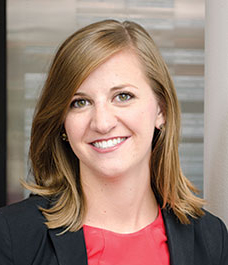Soon nonprofit leaders from all over the country may line up for the opportunity to earn a Vanderbilt MBA degree tuition-free.
In spring 2014, the Executive MBA program opened up eligibility for its annual nonprofit sponsorship to those outside the Nashville area for the first time. The sponsorship, which gives deserving executives at 501(c)(3) organizations access to a business education they otherwise might not be able to afford, had previously been reserved for applicants in Middle Tennessee.
In June, the school announced that Abby Shue, vice president of the Kentucky Center for the Performing Arts in Louisville, was selected as its Class of 2016 recipient. Shue’s selection marked an important new chapter for not only the sponsorship but the school as well. By bringing in the best candidates possible, regardless of geographic location, Owen signaled its intent to play a bigger role in bridging the nonprofit and for-profit worlds.

“It was the nonprofit alumni—the past recipients of the sponsorship—who came to us and encouraged us to expand our nonprofit reach,” says Juli Bennett, MBA’93, executive director of the Executive MBA and Americas MBA for Executives programs. “They saw the need to strengthen the sponsorship’s impact, and we at Vanderbilt agreed with them. It makes sense to draw from a strong nationwide applicant pool that mirrors the one we draw from for our entire EMBA class.”
Puts nonprofits on equal footing
Shue’s interest in earning an MBA stemmed from her work with senior management and the board of directors at the Kentucky Center, which is home to five resident performance companies, including the Louisville Orchestra and Kentucky Opera. The 30-year-old center hosts more than 1,000 events per year. Among her responsibilities are helping oversee general operations and directing strategy.
“Arts administration is a large field that remains relatively undefined. Like any nonprofit, we need to focus on operational effectiveness and efficiency,” Shue says. “I can’t imagine a better way to hone my managerial skills and learn to tackle complex business issues than in an Executive MBA program like Vanderbilt’s.”
The sponsorship, which began as a partnership with the Nashville Center for Nonprofit Management in 2006, is a rarity at a business school in the U.S. Unlike other schools that offer partial scholarships for such programs, Vanderbilt covers the full two years’ worth of tuition, or approximately $95,000. The program is currently funded from Owen’s operating budget, although the school would welcome a named sponsor for it.

To be considered, an applicant must meet the same criteria as any other Executive MBA candidate, including a strong GMAT score, record of academic accomplishment, previous management experience, professional recommendations and a formal interview.
Sponsorship recipients follow the same curriculum as their classmates, completing 60 credit hours of coursework over a two-year period and working closely with their peers. Part of that work includes two capstone projects that provide valuable strategic experience. They also have access to the school’s top-ranked Leadership Development Program.
“Our nonprofit students are exposed to the best practices in the business world,” Bennett says. “They learn the way their board members think and understand the expectations for how a nonprofit should perform.”
The interaction with their for-profit peers is a crucial part of the experience, Bennett notes. “They must be the voice for nonprofit in the classroom,” she says, “and cause others to ask, ‘How do I give back when I finish this two-year journey I’m on and make good things happen in my community?’
“But at the same time they must learn from the for-profit voices in the room, too, and ask questions like, ‘How are my challenges different from those in the for-profit world? And what are the challenges that don’t seem the same but really are?’”
Bridge for nonprofit and business sectors

Former recipient Michael McSurdy, EMBA’09, attests to the difference the sponsorship has made in his career. Today he is president and CEO of Family and Children’s Service, which provides counseling and child well-being services across the state of Tennessee.
“Five years out from graduation, the benefit of my time at Owen is clearer to me,” he says. “I’m a much more strategic thinker. I’m also more keenly aware of the value of a full team in moving my organization forward. I see daily how my broader understanding of management and finance is applicable in the nonprofit world, and I’m better at bridging the gap between the social service sector and personal and corporate philanthropy.”
Beth Torres, EMBA’11, another former recipient, shares McSurdy’s convictions about the sponsorship. She credits it with giving her the confidence to assume her current role as CEO of Make-A-Wish Middle Tennessee, an organization that grants the wishes of children with life-threatening medical conditions.
“I had good business instincts before Vanderbilt,” she says, “but Owen gave me the language to communicate. If something didn’t make sense, I learned to ask questions immediately—where I may have waited before. Owen gives you that. You’re in a room with 50 of the smartest people you’ve ever met and they’re asking questions. If they’re asking them, I have no excuse. I can admit what I don’t know.”
In working with corporate partners at Make-A-Wish, Torres sees more similarities than differences between the nonprofit and for-profit worlds.
“The nonprofit sector and the traditional for-profit are not that different, and they shouldn’t be,” Torres says. “Too often we’ve made exceptions for nonprofit, saying, ‘If we don’t reach as many people, if we don’t raise as much money, it’s OK. We tried really hard.’ That can’t be OK. If we miss on fundraising or on our mission, people don’t get served. We should be holding ourselves to higher, not lower, standards.”
Know of someone who would be a good candidate for the nonprofit sponsorship? The Executive MBA team wants to hear from you. Go to vu.edu/owen-nonprofit for more information. Contact Sarah Fairbank at 615-322-3120 or email sarah.fairbank@owen.vanderbilt.edu.

Leave a Reply